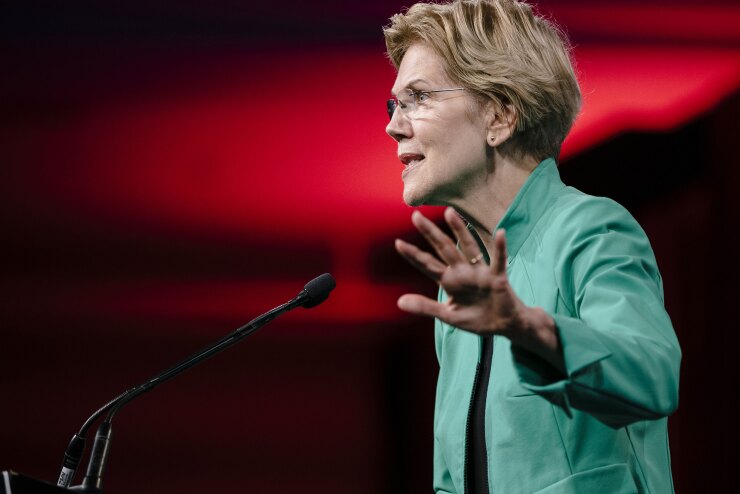WASHINGTON — Financial services trade groups and large banks are among the organizations targeted in Sen. Elizabeth Warren's proposal to impose steep taxes on lobbying.
In a blog post Wednesday, the Massachusetts Democrat and presidential candidate announced what she described as a crackdown on “excessive lobbying.”
Her plan would impose a 35% tax on lobbying expenditures between $500,000 and $1 million per year by corporations and trade groups. Organizations that spend between $1 million and $5 million would face a 60% tax. Lobbying expenditures above $5 million would be taxed at 75%.
“This tax will reduce the incentive for excessive lobbying, and raise money that we can use to fight back against this kind of onslaught when it occurs,” Warren wrote in a
“Every dollar raised by the lobbying tax will be placed into a new Lobbying Defense Trust Fund dedicated to directing a surge of resources to Congress and federal agencies to fight back against the effort to bury public interest actions by the government.”

In the post, Warren described corporate lobbyists as “experts at killing widely popular policies behind closed doors.”
Some details of the plan remained murky, but the various tax buckets suggest several trade groups who speak on behalf of financial services firms would be affected, based on data for their lobbying expenditures compiled by the Center for Responsive Politics.
The American Bankers Association would likely be the only banking trade group to be taxed at the 75% level. The group has already spent more than $5 million on lobbying in 2019, according to
The Independent Community Bankers of America and the Consumer Bankers Association would be subjected to the 60% tax on expenditures for spending more than $1 million on lobbying in 2019, according to data from the Center for Responsive Politics.
The Bank Policy Institute, which was formed last year when the Clearing House Association and the Financial Services Roundtable merged, would at least be subjected to the 35% lobbying tax. The group has spent about $840,000 so far on lobbying in 2019, according to the Center for Responsive Politics.
The proposal would not subject just trade groups to new taxes. Lobbying expenditures at a number of large and regional banks exceeded the minimums Warren proposes for her lobbying tax, according to the Center for Responsive Politics. Among the four largest banks, Wells Fargo, Citigroup and JPMorgan Chase all would face the 60% tax with their lobbying expenditures each exceeding $1 million. With expenditures just below $1 million, Bank of America would pay the 35% tax.
The Online Lenders Alliance, which represents installment lenders, would likely be subjected to the 35% lobbying tax as well. So far in 2019, the alliance, which the Center for Responsive Politics lists among payday lending groups,
Warren singled out payday lenders in her blog post for their efforts to lobby the Consumer Financial Protection Bureau — the idea of which Warren first proposed before she was in the Senate — to weaken its payday lending rule. The CFPB under the Trump-appointed Director Kathy Kraninger proposed in February to roll back tough underwriting requirements that were championed by the agency in the Obama administration.
“When the Consumer Financial Protection Bureau tried to crack down on payday lenders exploiting vulnerable communities, lobbyists convinced the Trump administration to cripple the rule — while the payday lenders who hired them spent about $1 million at a Trump resort,” Warren wrote.
“Regulatory agencies are only empowered to implement public interest rules under authority granted by legislation already passed by Congress. So how is it that lobbyists are able to kill, weaken, or delay so many important efforts to implement the law?”
Camden Fine, president and CEO of Calvert Advisors and former head of the ICBA, said the major banking trade groups that would be affected by the proposal would likely adjust by either cutting lobbying expenses or increasing dues or the costs of products and services to offset the new tax burden.
“Trade groups like ICBA ... could probably adjust if they had to," he said. "Not that they would escape taxation, but they could probably adjust and adapt to where they got the tax down to 35%. But there is no question that her lobbying tax proposal would have a massive impact on the trade groups.”
Fine said Warren’s proposal would be “immediately challenged in the courts as a violation of the first amendment.”
“I can see in court lawyers arguing that that tax is a punishment and would inhibit the right of the people to petition the government to redress their grievances,” Fine said. “I think she’d have a First Amendment issues that she’d have to deal.”
Some observers say it is unclear how the lobbying tax would be implemented from a practical standpoint. For one thing, lobbying can be a subjective term that is loosely applied to various different activities.
"There are very few legal definitions of what constitutes lobbying," said Brian Gardner, policy analyst at KBW. "That was always a problem with registering as a lobbyist in the House or the Senate.”
Warren's plan is “political messaging,” he added.
“I suspect the courts would have a real tough time with this. … As a Harvard Law School professor, she knows this,” Gardner said. “In my opinion, this is not a serious tax proposal. It’s pure politics.”
The announcement comes after a series of proposals from Warren to crack down on
Last year, Warren rolled out legislation to prohibit the world’s biggest companies, including banks, from hiring former senior government officials for four years after they left the public sector. The plan would also impose lifetime lobbying bans on presidents, vice presidents, members of Congress, federal judges and Cabinet secretaries.





